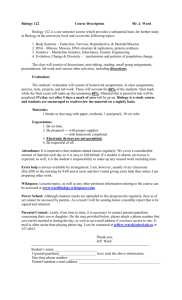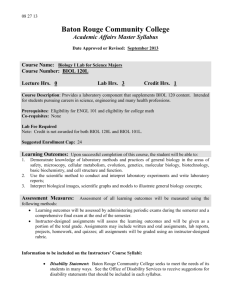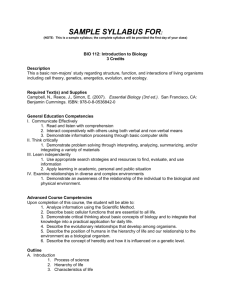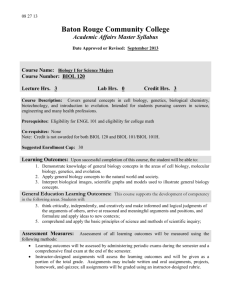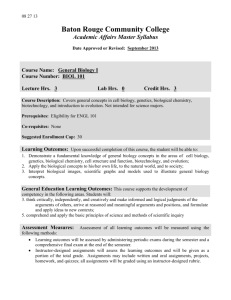DeVry Institute of Technology
advertisement
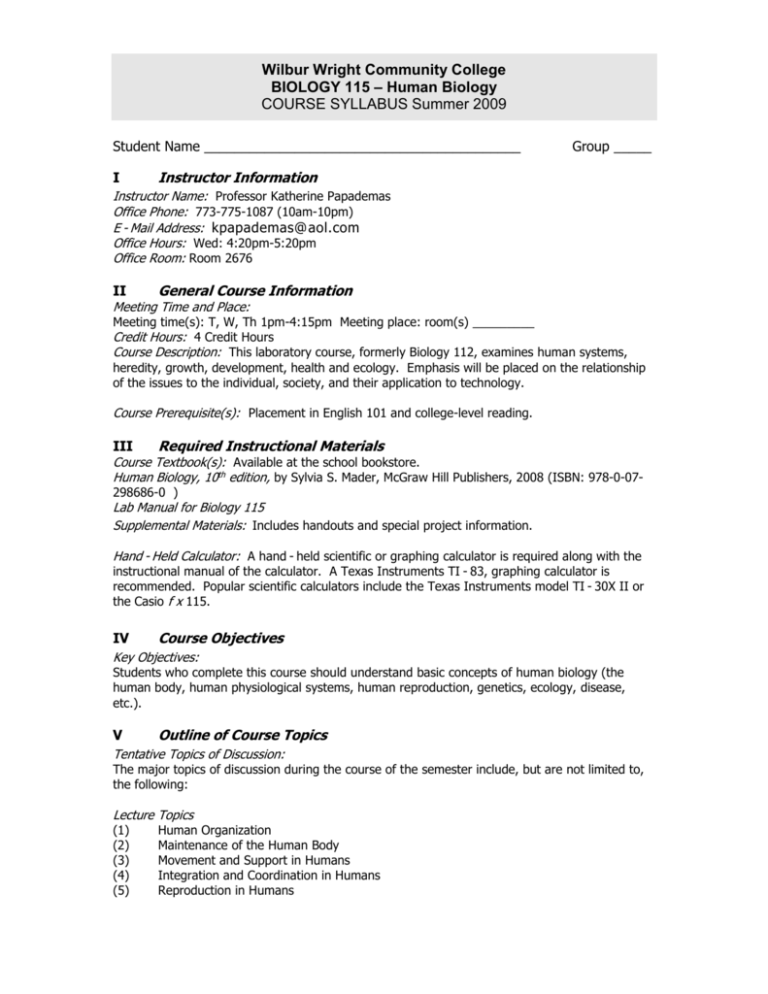
Wilbur Wright Community College BIOLOGY 115 – Human Biology COURSE SYLLABUS Summer 2009 Student Name __________________________________________ Group _____ I Instructor Information Instructor Name: Professor Katherine Papademas Office Phone: 773-775-1087 (10am-10pm) E - Mail Address: kpapademas@ aol.com Office Hours: Wed: 4:20pm-5:20pm Office Room: Room 2676 II General Course Information Meeting Time and Place: Meeting time(s): T, W, Th 1pm-4:15pm Meeting place: room(s) _________ Credit Hours: 4 Credit Hours Course Description: This laboratory course, formerly Biology 112, examines human systems, heredity, growth, development, health and ecology. Emphasis will be placed on the relationship of the issues to the individual, society, and their application to technology. Course Prerequisite(s): Placement in English 101 and college-level reading. III Required Instructional Materials Course Textbook(s): Available at the school bookstore. Human Biology, 10th edition, by Sylvia S. Mader, McGraw Hill Publishers, 2008 (ISBN: 978-0-07298686-0 ) Lab Manual for Biology 115 Supplemental Materials: Includes handouts and special project information. Hand - Held Calculator: A hand - held scientific or graphing calculator is required along with the instructional manual of the calculator. A Texas Instruments TI - 83, graphing calculator is recommended. Popular scientific calculators include the Texas Instruments model TI - 30X II or the Casio f x 115. IV Course Objectives Key Objectives: Students who complete this course should understand basic concepts of human biology (the human body, human physiological systems, human reproduction, genetics, ecology, disease, etc.). V Outline of Course Topics Tentative Topics of Discussion: The major topics of discussion during the course of the semester include, but are not limited to, the following: Lecture Topics (1) (2) (3) (4) (5) Human Organization Maintenance of the Human Body Movement and Support in Humans Integration and Coordination in Humans Reproduction in Humans Human Biology BIOS 115 (6) (7) (8) COURSE SYLLABUS 2009 Human Genetics Human Disease Human Origins and Ecology Tentative Laboratory Schedule No Food or Drink allowed in the lab! Please think safety in the Laboratory. Safety glasses are available to students and are required when called for in the laboratory procedure(s). 6 Exp. No. 1 2 Date 06/03/09 06/04/09 Lab Activity pH Lab Buffers 3 4 5 06/09/09 06/10/09 06/11/09 Food Testing Microscopy Lab Diffusion 6 7 8 06/16/09 06/17/09 06/18/09 Dialysis Histology Brain Anatomy 9 10 11 06/23/09 06/24/09 06/25/09 Reflexes in Humans Insulin Shock Reproduction and Development, Human Genetics 12 13 14 06/30/09 07/01/09 07/02/09 Circulation, Cardiac Physiology Blood Typing and Genetics Immunity 15 16 17 07/07/09 07/08/09 07/09/09 Digestive Anatomy Chemical Digestion Nutrition 18 19 20 07/14/09 07/15/09 07/16/09 Measuring Lung Capacities Kidney Anatomy, Urinalysis lab Musculoskeletal System; and pH and Acid Deposition 21 07/21/09 07/22/09 07/23/09 Rat Dissection Lab VI Final Exam Methods of Evaluating Student Progress Your final course grade will be based on actively pursuing and completing the following: Homework Assignments Weekly Quizzes In - Class Exercises Final Exam Laboratory © Copyright 2009 by P.E.P. 10% 40% 10% 20% 20% 2 BIOS 115 Human Biology COURSE SYLLABUS 2009 Grade Breakdown: Grading Scale: Grading will be accomplished using the following traditional scale: 100 to 90 A 79 to 70 C 89 to 80 B 69 to 60 D 59 to 0 F Homework Assignments Homework assignments are generally issued on a weekly basis. Completing these assignments is an integral part of success in the course. A Homework Assignment will be given on a weekly basis and lists the page numbers and exercise numbers of the individual assignment. Quizzes Weekly quizzes will be given during the course of the semester. There are no make - ups for any missed quizzes. In – Class/Outside Class Exercises Throughout the semester there may be a number of special exercises/assignments given during the classroom session. Due dates for these exercises/assignments will be announced during class. Final Exam The final exam is cumulative and therefore includes material from the entire semester. The final exam is a closed book and closed notes type exam. Be sure to study the guide given by the Biology Department to help you with the final exam. Laboratory Students are required to complete the report for each experiment performed in the laboratory. The reporting forms are found in the Human Biology Lab Manual. VII Methods of Instruction Instruction Techniques: The methods used to instruct the course material may include: (1) Lecture-oral presentation (2) Class discussion (3) Individual and group projects (4) Discovery or the Socratic method of asking questions. VIII Course Practices Required Student Practices: Students enrolled in this class should (1) attend class regularly, (2) complete reading and written assignments on time and (3) be able to demonstrate assigned problems. Make - Up Work: All assignments and projects are expected to be completed when they are due. There are no individual make - ups for any of the in - class exams. © Copyright 2009 by P.E.P. 3 BIOS 115 Human Biology COURSE SYLLABUS 2009 IX Academic Integrity Integrity Policy from the City Colleges of Chicago: The City Colleges of Chicago is committed to the ideals of truth and honesty. In view of this, students are expected to adhere to high standards of honesty in their academic endeavor. Plagiarism and cheating of any kind are serious violations of these standards and will result, minimally, in the grade of “F” by the instructor. X Other Course Information Additional Items of Note: (a) (b) (c) (d) (e) (f) (g) You are encouraged to work in small groups to complete your assignments. The recommended amount of study time is two hours for each class lecture hour. You are responsible for any classes that you miss. Have telephone numbers of others in the class, get assignments, notes, deadlines etc. from them. If you cannot get in touch with them, then you can E - mail the instructor. Changes to this syllabus may be made when deemed appropriate and without notice. Leave the classroom and lab in proper order and as clean or cleaner than you found it. Remember to push in your chair at the lab. Tutors are available by appointment in room ________. Students are responsible to keep all of their graded homework, in - class work and lab projects should there be a need to verify that these works were completed. XI Academic Etiquette Classroom Behavior: To be successful, a lecture session should include, but is not limited to, the following standard guidelines for student classroom behavior: (1) come to class prepared and bring all appropriate materials, (2) be courteous, and treat one another and your professor with respect, (3) complete all assignments on time, (4) pay careful attention to the lecture and (5) follow any instructions promptly. Student conduct from the City Colleges of Chicago: City Colleges of Chicago students are expected to conduct themselves in a manner which is considerate of the rights of others and which will not impair the educational mission of the College. Misconduct for which students are subject to College Discipline (e.g. expulsion) may include the following: (1) all forms of dishonesty such as stealing, forgery, (2) obstruction or disruption of teaching, research, administration, disciplinary proceeding, (3) physical or verbal abuse, threats, intimidation, harassment, and/or other conduct that threatens or endangers the health or safety of any person, and (4) carrying or possession of weapons, ammunition or other explosives. XII Attendance Policy Attendance Policy: Attendance in class is strongly encouraged to successfully complete this course. © Copyright 2009 by P.E.P. 4

